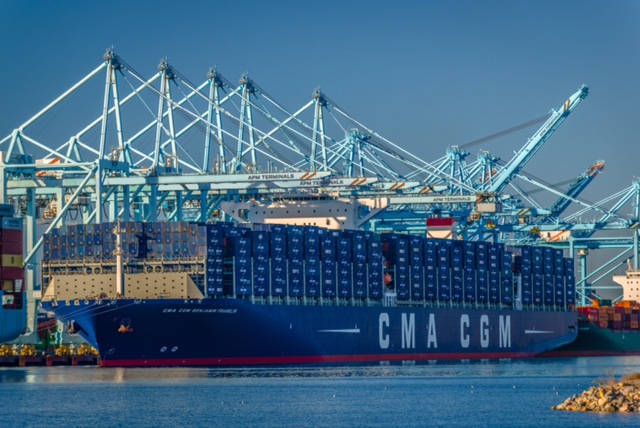Michael Dykes, president, International Dairy Foods Association (IDFA), said an alliance between ocean carrier CMA-CGM and the Port of Los Angeles is expediting dairy exports.
Dykes spoke at a Port of Los Angeles media briefing hosted by Executive Director Gene Seroka.
Dykes has noted that the IDFA Dairy Exports Working Group has removed obstacles for U.S. dairy exports departing from West Coast ports, created programs and incentives dedicated to moving U.S. dairy exports with greater urgency, improved communication between dairy companies and shippers, and begun talks on long-term investments in interior transit solutions:
“This partnership began last Christmas by taking some of the empty containers heading back to Asia, converting them for exports of dairy products. Our members are business-people and we wanted to find business solutions to this issue. The supply chain is such an endless series of steps, we wanted to find one play and make a difference and work out from that and it has worked beautifully.”

Collaboration with the Port of LA
Dykes says that the collaboration with CMA-CGM and the Port of Los Angeles expedited the conversion of empty containers to containers filled with dairy products: “… we are very grateful for the work we have done with you at the Port of Los Angeles and for the folks at CMA/CGM … The alliance that we announced in January has made a tremendous difference for our dairy industry and our exporters … Across all ports, we have seen a 53.7% increase in dairy products being in containers for the first 21 weeks of this year. That’s remarkable… a 110% increase at the Port of LA…”
Dykes said that CMA-CGM is “committed to doing even more in the future.”
Dykes also acknowledged the support of the Biden administration and particularly U.S. Agriculture Secretary Tom Vilsack: “We have worked with the White House and the U.S. Department of Transportation and the U.S. Department of Agriculture. I cannot say enough about USDA Secretary Tom Vilsack and his willingness to engage on this issue and the prioritizing the importance of exports.”
More Infrastructure Investment Needed
Dykes said that while President Biden’s infrastructure bill was a positive first step, more money was needed to help connect rural farm exporters with transportation of goods to ports and emphasized the need for more investment in rail links:
“We need connectivity, and we need speed for agricultural exporters who come from rural areas. We need the infrastructure money to advance both of those causes where these chassis and containers can be stored and gotten closer to the source. We need greater space for rail at these ports. We need the rail to get the agricultural products from the interior to the ports. And we need more money to make the change happen faster.”
He said that more recruitment of workers was need to support both the dairy industry and agriculture: “Workforce is the number one issue facing our members. How do we attract and how do we retain the best talent? We need to make sure we’ve got an inclusive and equitable and a diverse population of workers.”
Dykes welcomed imminent passage of the Ocean Shipping Reform Act: “We have been very supportive of the ocean shipping reform act. We are very pleased to see it passed. Yes, the short answer is yes, we are optimistic that it will address the demurrage issues.”
Dykes said agricultural exports have been one of the few bright spots in the U.S. balance of trade: “Agricultural exports are the only sector in the U.S. economy that has a positive balance of trade. We have had calls from the cotton industry to join this alliance. We have also helped the almond industry as part of this alliance. So, we have been reaching out to agriculture.”
Dykes said the dairy industry is “on pace to have another record year this year. We are not just moving volume, but we are also moving value-added products such as cheese and whey. Two-thirds of U.S. production of milk products is expected to go for export. Our future is largely dependent on our ability to export.”

